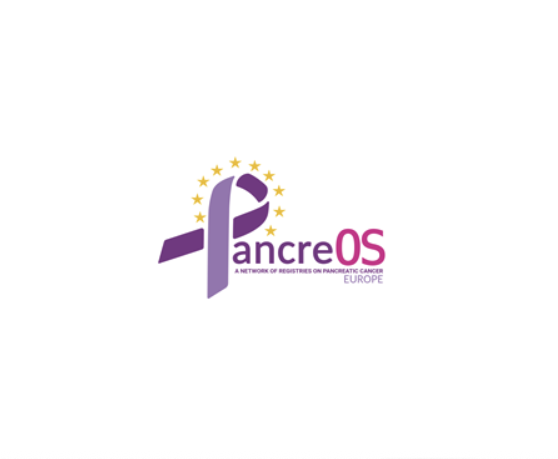
Summary
Launched in 2021 by Pancreatic Cancer Europe, the PancreOS project aims to establish a pan-European network of pancreatic cancer registries by linking existing databases. It is designed to advance the understanding, diagnosis and treatment of pancreatic cancer. To date, the programme has successfully mapped existing registries, implemented an online data collection system and begun gathering data from participating registries. By addressing critical knowledge gaps and enabling comprehensive data analysis, PancreOS will drive improvements in health outcomes. It also has the potential to support evidence-based policy and clinical decision-making.
Challenge
The global incidence of pancreatic cancer has more than doubled in recent decades; pancreatic cancer is now ranking as the sixth leading cause of cancer-related mortality, accounting for nearly 5% of all cancer-related deaths worldwide.12 It is the fourth leading cause of cancer deaths in Europe and the only cancer with rising mortality in both females and males.3
This trend is linked to late diagnoses, which result from the cancer’s aggressive nature, vague symptoms and limited early detection methods.1 3 Improving survival rates depends on gaining a better understanding of the disease and earlier diagnosis, tasks for which pancreatic cancer registries are essential.3
Related to that, making access to new treatment options more universal would improve long-term outcomes for people with pancreatic cancer. This process is also underpinned by registry data – gathering more real-world survival data to better understand the cancer’s burden across Europe can enable more accurate cost analysis, identification of unmet needs and inform planning of care at national and regional levels.
Solution
Pancreatic Cancer Europe launched the PancreOS project in 2021 to build a European network of pancreatic cancer registries.4 Cancer registries provide insights for stakeholders in cancer care and, when updated with staging information, enable monitoring of access, care quality and outcomes.5
By linking existing databases, PancreOS aims to deliver valuable insights to people living with pancreatic cancer, researchers, healthcare providers and policymakers, ultimately advancing their understanding of pancreatic cancer in Europe.3 It is hoped that over the initial five years of running, PancreOS will improve comprehensive data collection for people at all stages of the disease, address current knowledge gaps through access to comprehensive data, and advance understanding, diagnostic strategies and personalised treatments for pancreatic cancer.4
Between 2022 and 2024, the PancreOS project achieved significant milestones in improving the understanding and management of pancreatic cancer.3 Some of these achievements include mapping existing pancreatic cancer registries across Europe and establishing connections among population- and hospital-based registries.3 An online data collection system (REDCap) has been implemented, with 22 registries expressing interest in joining and 9 already actively entering data.3 Data collection is underway from the initial participant registries, with preparations for the PancreOS data analysis also in progress.3
Through analysing diagnostic procedures, tumour characteristics, treatments and survival data, PancreOS identified key unmet needs which, if addressed, would deliver more reliable diagnosis and better outcomes.3
PancreOS has identified the need to collect more standardised data, develop uniform protocols for tumour characteristics, and improve understanding of treatment differences across Europe. Successfully addressing those gaps would allow stakeholders to develop new treatment protocols and improve patient care, as well as improving consistency in survival data reporting.3
Next steps
To further advance the European network of pancreatic cancer registries, some of the future objectives for PancreOS include expanding the number of participating registries and collecting summarised data from other registries.3
Findings from the PancreOS project are to be disseminated at various professional events and distributed to all relevant stakeholders, including policymakers, journalists, clinicians and researchers.3
References:
- Leiphrakpam PD, Chowdhury S, Zhang M, et al. 2025. Trends in the Global Incidence of Pancreatic Cancer and a Brief Review of its Histologic and Molecular Subtypes. J Gastrointest Cancer 56(1): 71 [accessed: November 2025]
- Bray F, Laversanne M, Sung H, et al. 2024. Global cancer statistics 2022: GLOBOCAN estimates of incidence and mortality worldwide for 36 cancers in 185 countries. CA: A Cancer Journal for Clinicians 74(3): 229-63 [accessed: December 2022]
- Pancreatic Cancer Europe. 2024. PancreOS Project - A network of registries on pancreatic cancer in Europe. Brussels: Pancreatic Cancer Europe ASBL [accessed: December 2024]
- Pancreatic Cancer Europe. n.d. PancreOS – Pancreatic cancer overall survival registry in Europe. Available here: https://pancreaticcancereurope.eu/project/pancreos-pancreatic-cancer-overall-survival-registry-in-europe-2021/ [accessed: September 2025]
- All.Can 2024 Action Guide For Efficient Cancer Care - An implementation toolkit. Available here: https://www.all-can.org/wp-content/uploads/2024/09/AllCanActionGuide24-1.2.7.pdf [accessed: September 2024]